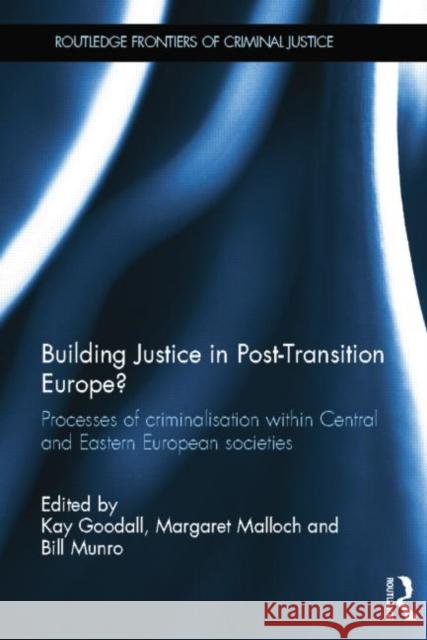Building Justice in Post-Transition Europe?: Processes of Criminalisation Within Central and Eastern European Societies » książka
Building Justice in Post-Transition Europe?: Processes of Criminalisation Within Central and Eastern European Societies
ISBN-13: 9780415622400 / Angielski / Miękka / 2014 / 196 str.
Building Justice in Post-Transition Europe?: Processes of Criminalisation Within Central and Eastern European Societies
ISBN-13: 9780415622400 / Angielski / Miękka / 2014 / 196 str.
(netto: 186,53 VAT: 5%)
Najniższa cena z 30 dni: 186,33
ok. 22 dni roboczych.
Darmowa dostawa!
After the collapse of the Berlin wall in 1989 and disintegration of the Soviet Union, scholars focused on the problems of legal transitions within the newly emerging democracies. Two decades on, these states are in post-transition conditions; having undergone and continuing to experience political, economic and constitutional upheavals to varying degrees. Criminal law and processes of criminalisation and decriminalisation are at the heart of these changes, and must be understood in the light of the social transitions. A major influence is the old West a relationship that has often been more maleficent than it may appear. This book provides an interdisciplinary perspective on this largely unexamined topic.
Part I of the book sets the scene with a socio-historical overview and a theoretical chapter; both of which contextualise the book within current debates and provide the theoretical direction of the book as a whole. The later chapters set out contrasting perspectives and consist of themed essays on individual legal systems, investigating these through approaches ranging from socio-legal study to political economy. The book aims to refine important directions for the comparative conceptual study of criminal law policy and processes of criminalisation in emerging democratic states. The result is a significant contribution to the understanding of this subject in the fields of criminology, law, philosophy and political science.
The book will appeal to academics, policy-makers and practitioners who are attempting to grapple with the area of "transitions" in the fields of criminology, law, philosophy and political science. As a distinctively interdisciplinary text, it brings together analysis of both the social processes of creating (and abandoning) criminal law and a philosophical reflection. The book provides a comprehensive and critical analysis which points to future directions in criminalisation in the emerging democratic states of Eastern Europe.











